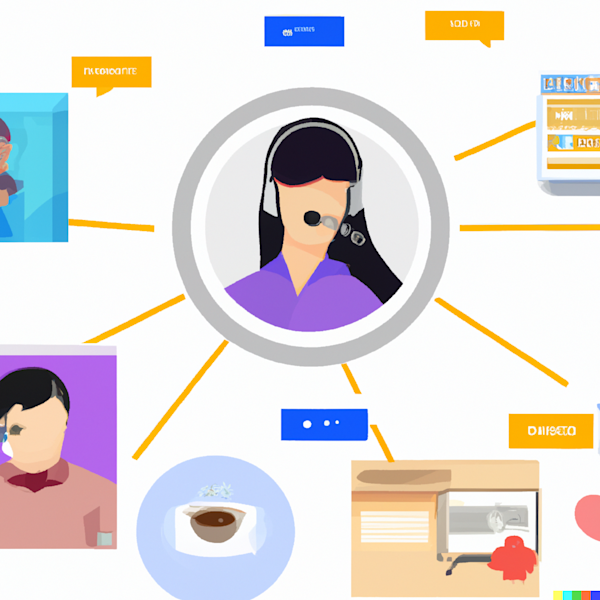The world changed to remote working in 2020 and so have contact centers. Agents can now take customer calls from home, virtually. This has led to many companies adopting virtual call centers for their business. In fact, Gartner predicts that contact center as a service (CCaaS) will hit mainstream adoption for customer service by 2023.
What is a virtual call center?
A virtual call center is also known as a virtual contact center or VCC in short. It is a solution for companies in which contact center agents are dispersed across the globe instead of working from one physical location. These contact center agents provide customer service interactions. Because it is virtual, this solution provides efficient use of agents in various geographies. They get matched with customers based on the needs of the customer and business.
Typically, a VCC manages and sends customer service calls through an internet-based system or a virtual call center software. This allows them to choose appropriate agents, resulting in efficient customer service.
How does a virtual contact center work?
A VCC typically uses cloud-based software, which is why the term “Contact Center as a Service (CCaaS)” is commonly used for virtual contact centers/virtual call centers. For this, a VCC only requires an internet connection and telecommunication services. They are set up in different locations for agents/employees working from home. Other infrastructure includes a laptop, contact center software, and internal communications software such as video conferencing tools and email.
A virtual contact center handles two types of contact centers: inbound and outbound. An inbound call center attends to existing (and some potential) customers calling the agents with inquiries around a product or service. This involves frequently asked questions, technical support, complaints, and other issues. On the other hand, an outbound call center deals with agents making calls to current or potential customers with regard to their business. This usually deals with cold calling as well.
There is also a third type of contact center which is the blended version of inbound and outbound calls. As the name suggests, a blended call center handles both inbound and outbound calls, attending to both existing customers while also calling potential customers depending on what the business strategy dictates.
How to start a virtual call center: Things to consider
You may be at the peak of your business and in the process of considering a virtual call center for your company. It saves space and can help provide around-the-clock support to your customer base. If you are looking to start a virtual call center for your business, here are some things to consider:
Find your focus: Is your contact center going to be an inbound, an outbound, or a blended call center? Do you want to increase/improve customer support through inbound calls or bring in more customers through outbound calls? The answers to these questions depend on the nature of your business, product or service. In order to determine which type of call center you want to open, it is important to outline the goals of opening one.
Budget: Evaluate your budget to see how much you need to spend in order to start your own virtual contact center. While you may be saving some money on the space and infrastructure of a physical location, you still need to invest in IT systems, cloud software, telecommunications, internal communications, and customer service agents.
Infrastructure: Which brings us to the next point - finding the right infrastructure. For the above-mentioned key elements of a virtual call center, finding the right partner is also crucial. This involves time to evaluate and see which CCaaS partner is best for your business for each element.
Agents: Once the software is in place, finding the right agents is also crucial. Interviewing, hiring, and training the right people remotely can be challenging, and this is something to consider.
Business growth: When building your virtual contact center, align the investment with your business plan and see how it fits in with your business goals. The time and cost involved in starting a virtual contact center can be a potential issue for your business growth. This is where budget evaluation and considering whether you need to outsource your virtual contact center plays a key role.
Should you outsource your virtual contact center?
Typically, outsourcing a virtual call center is more cost-effective than starting one on your own as a business. When you outsource your VCC, it allows you to focus more on your business. Here are some reasons you may want to consider outsourcing your virtual contact center:
Save time to focus on your business: You will spend less time looking for the resources mentioned previously and leave it in the hands of an outsourcing partner who has relevant experience in the field.
With experience comes the right infrastructure: The right partner will already have all the necessary infrastructure for your call center to be up and running. This includes agents, software, technology, telecommunications, and even futuristic technology such as AI-powered services.
Provide 24x7 customer service: With an outsourced call center, customers across the globe will have access to agents across different geographies. Based on where the customer is, the right agent will be assigned.
Always stay up-to-date with the technology: When running your own virtual contact center, you will need to keep up with the latest technology updates in the field. However, outsourcing to the right partner will take that off your plate, as they will ensure the technology used is always updated.
Receive customer interaction insights: Some outsourcing companies are using technologies such as artificial intelligence and machine learning to analyze and provide key insights to your business to improve the overall customer experience.
Why InflectionCX is the right partner for your virtual contact center
The right BPO partner will ensure that all training is aligned with your business goals, along with transforming your engagement with internal and external stakeholders. This is why InflectionCX offers AI-powered smart BPO services for your business to deliver superior, cost-effective experiences. Our team of highly trained professionals utilizes Inflection’s AI software stack to deliver cost-effective, superior experiences to businesses and their clients. Our agents are trained in voice and multichannel support to transform your customer experience.
Contact us today for your virtual call center to be set up the right way.




